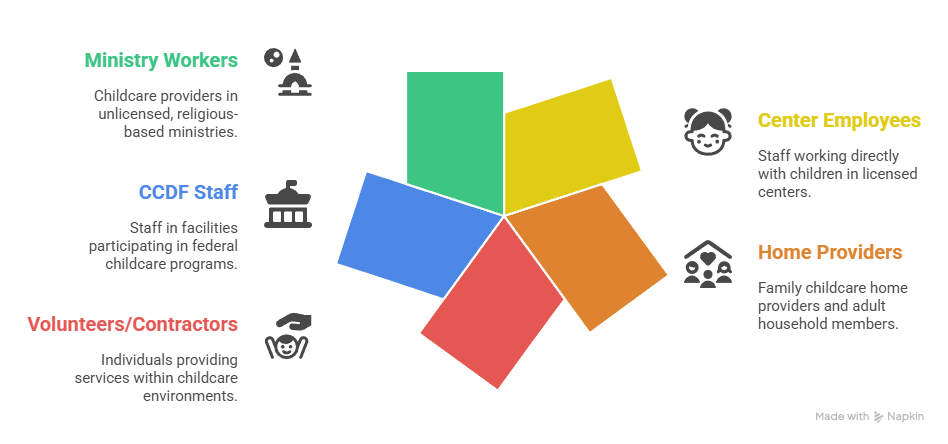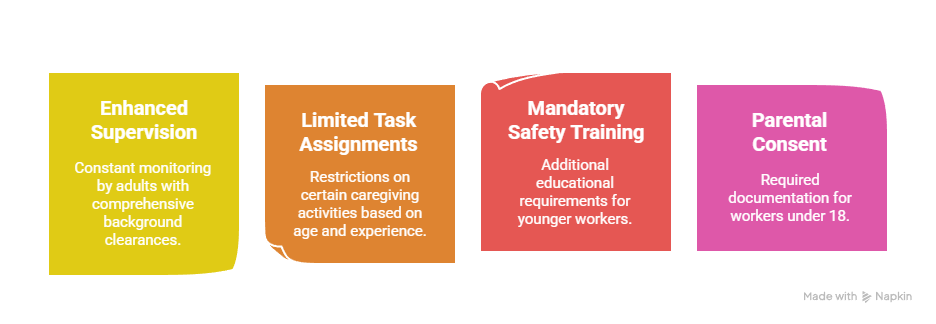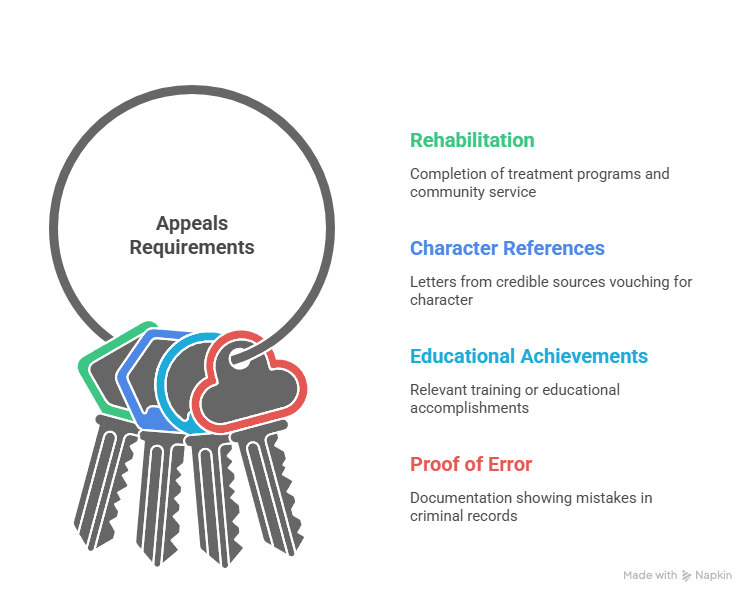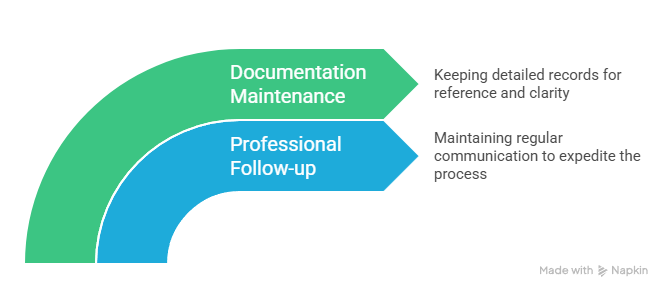Indiana childcare background checks are comprehensive screening processes managed by the Family and Social Services Administration (FSSA) that include fingerprint database searches, sex offender registry checks, and Child Protection Index reviews. Recent legislative changes under Senate Enrolled Act 2 have expanded opportunities for younger workers while maintaining strict safety standards for children in care.
Key Takeaways
- All childcare workers, volunteers, and household members at family childcare homes must complete comprehensive background checks before beginning work with children.
- Background checks must be renewed every three years, with annual updates required for sex offender registry and Child Protection Index screenings.
- The Child Care Development Fund (CCDF) imposes additional federal screening requirements that exceed state minimums for participating providers.
- Senate Enrolled Act 2 allows 18-year-olds to serve as lead teachers and permits 16-17 year olds to work as caregivers under enhanced supervision.
- Violent crimes, sexual offenses, and drug-related convictions typically result in automatic disqualification from childcare employment.
- Indiana provides a formal appeals process for individuals who wish to contest background check disqualifications within 30 days.
Understanding Indiana Childcare Background Check Requirements
Navigating the landscape of background checks for childcare workers in Indiana is essential for both job seekers and employers. The foundation of these requirements is set by the Family and Social Services Administration (FSSA) through the Office of Early Childhood and Out-of-School Learning (OECOSL). These checks are designed to ensure the safety and well-being of children, a responsibility that cannot be understated in 2024's evolving childcare environment.
The Indiana childcare background check process serves as the cornerstone of child protection in licensed facilities, unlicensed registered ministries, and in-home care settings. Every individual planning to work with children must undergo comprehensive screening that meets both state and federal standards. This mandate extends beyond direct employees to include volunteers, contract workers, and household members at family childcare homes, creating a comprehensive safety network around vulnerable populations.
Who Must Complete Background Checks

Understanding who requires screening is crucial for compliance. The following individuals must complete Indiana childcare background checks:
- Licensed childcare center employees: Every employee at state-licensed childcare facilities must undergo comprehensive background screening before beginning work, regardless of their specific role or responsibilities. This requirement includes full-time and part-time workers, substitute teachers, administrative staff with child contact, and even employees who may only occasionally interact with children during their duties.
- Family childcare home providers: Operators of family childcare homes must complete background checks along with every adult residing in the home, even if household members have no direct involvement in childcare activities. This comprehensive household screening ensures that all adults with potential access to children in care have been properly vetted for safety and suitability.
- Volunteers and contractors: Individuals providing unpaid volunteer services or contracted work in childcare facilities must complete the same rigorous background check process as paid employees. This includes maintenance workers, food service providers, transportation staff, educational consultants, and any other service providers who may have access to children during facility operations.
- CCDF-participating facility staff: Workers at childcare facilities that accept Child Care Development Fund vouchers must meet stricter federal background check requirements in addition to state mandates. These enhanced standards often include more comprehensive criminal history searches, additional database checks, and stricter disqualification criteria that exceed Indiana's baseline requirements.
- Unlicensed registered ministry workers: Staff members at religious organizations providing childcare services, even those exempt from state licensing requirements, must still complete state-mandated background checks. These faith-based providers must ensure all workers undergo the same screening process as licensed facilities to maintain compliance with Indiana's child protection standards.
The scope of required screenings ensures comprehensive protection across all childcare environments. Even substitute teachers and part-time workers must complete the full background check process before beginning employment.
Background Check Components
Indiana childcare background checks consist of three critical elements that work together to create a comprehensive screening process. The federal and state fingerprint database search examines criminal history records across multiple jurisdictions, identifying any disqualifying convictions that might affect employment eligibility. This component serves as the primary screening tool for detecting violent crimes, drug offenses, and other serious criminal activity.
The Indiana Sex Offender Registry check ensures that no registered offenders can work in positions involving child care. This mandatory screening provides an additional layer of protection by identifying individuals who pose specific risks to children's safety and well-being.
| Component | Purpose | Frequency |
| Fingerprint Search | Criminal history verification | Initial + 3-year renewal |
| Sex Offender Registry | Identify registered offenders | Annual updates |
| Child Protection Index | Abuse/neglect history | Annual updates |
The Child Protection Index (CPI) search reviews records of substantiated child abuse and neglect cases within Indiana's system. This database helps identify individuals with documented histories of harming children, providing crucial information for employment decisions.
Background Check Frequency and Renewal Requirements
Understanding the timing requirements for Indiana childcare background checks is essential for maintaining compliance and avoiding employment gaps. The state has established specific timelines that balance thorough screening with practical employment needs.
Initial Background Check Timeline
The initial background check process typically takes 2-3 weeks to complete, though processing times can vary based on several factors. Job seekers should begin their background check process 3-4 weeks before their intended start date to accommodate potential delays. Factors affecting processing time include:
- Multi-state criminal history: Applicants with residence history in multiple states may experience longer processing times
- Incomplete documentation: Missing or incorrect information can delay screening
- Court system variations: Different counties may have varying response times for criminal record searches
- Fingerprint quality: Poor fingerprint quality may require resubmission
Planning ahead prevents employment delays and demonstrates professionalism to potential employers. Starting the process early also provides time to address any issues that may arise during screening.
Three-Year Renewal Cycle
Indiana requires childcare workers to renew their background checks every three years to ensure ongoing compliance with safety standards. This renewal process involves the same comprehensive screening as initial checks, including updated fingerprint database searches, sex offender registry verification, and Child Protection Index reviews. The three-year cycle helps maintain current information about all childcare workers while balancing administrative burden with safety requirements.
Employers must track renewal dates for all staff members and ensure timely completion of updated screenings. Missing renewal deadlines can result in employment interruptions and potential violations of state regulations.
Employment Gap Considerations: Workers who leave the childcare profession for more than 180 days must complete a new background check before returning to work. This requirement ensures that any criminal activity occurring during the employment gap is identified and evaluated.
Annual Registry Updates: Between three-year renewals, childcare workers must undergo annual screenings of the Indiana Sex Offender Registry and Child Protection Index. These updates help detect any new disqualifying information that may have emerged since the last comprehensive check.
The CCDF Connection: Federal Funding Requirements
The Child Care Development Fund (CCDF) represents a significant federal funding source for Indiana childcare assistance programs, serving thousands of families across the state. Understanding how CCDF requirements interact with state background check regulations is crucial for providers and workers in participating facilities.
Enhanced Screening Standards
CCDF-participating providers must meet federal background check standards that often exceed Indiana's baseline requirements. These enhanced standards include more comprehensive criminal history searches and stricter disqualification criteria. The federal government requires extended searches across national criminal databases, which may identify offenses that state-level checks might miss.
Stricter Disqualification Criteria: The CCDF program maintains a more extensive list of disqualifying offenses than Indiana state law requires. Crimes that may not disqualify someone under state regulations could still affect their eligibility to work at CCDF-participating facilities.
National Database Searches: Enhanced screening includes searches of national criminal databases, providing a more comprehensive view of an applicant's criminal history across all states and jurisdictions.
Funding Implications
Non-compliance with CCDF background check requirements can have serious financial consequences for childcare providers. Facilities that fail to meet federal standards risk losing access to CCDF funding, which often represents a significant portion of their operating budget. This funding loss can threaten the financial viability of childcare operations and impact job security for all employees.
The following table outlines the potential consequences of CCDF non-compliance:
| Violation Type | Immediate Impact | Long-term Consequences |
| Incomplete screening | Funding suspension | Loss of CCDF eligibility |
| Hiring disqualified staff | Immediate investigation | Potential facility closure |
| Missing renewals | Payment delays | Reduced parent enrollment |
Legal repercussions may include investigations by state and federal oversight bodies, civil penalties, and potential criminal charges for willful violations. Maintaining full compliance protects both the facility's operational viability and its reputation within the community.
Recent Legislative Changes: Senate Enrolled Act 2 (2024)
Senate Enrolled Act 2 has introduced significant modifications to Indiana's childcare staffing and background check requirements in 2024. These changes address workforce shortages while maintaining safety standards, creating new opportunities for younger workers in the childcare sector.
Age-Related Staffing Changes
The legislation has expanded employment opportunities for younger workers in childcare settings. Individuals who are 18 years or older can now serve as lead teachers in all childcare classroom settings, removing previous age restrictions that limited leadership roles. This change addresses staffing shortages by expanding the pool of qualified candidates for supervisory positions.
Additionally, teens aged 16 to 17 are now permitted to work as caregivers under specific conditions:

These changes provide valuable work experience for young people while maintaining appropriate safety oversight.
Background Check Implications
The inclusion of younger workers necessitates updates to background check protocols. New screening procedures must ensure that 16- and 17-year-olds meet all applicable safety standards while recognizing their limited criminal history potential. Enhanced supervision requirements mean that adult supervisors must maintain current background check status to oversee younger workers effectively.
Modified Screening Procedures: Adapted background check processes for younger workers may include alternative verification methods, such as character references and educational records, to supplement traditional criminal history searches.
Increased Supervision Standards: Facilities must implement robust oversight systems to ensure younger workers receive appropriate guidance and support while maintaining compliance with safety regulations.
Disqualifying Crimes
Understanding which criminal convictions bar employment in childcare is essential for both job seekers and employers. Indiana enforces strict guidelines to safeguard children, with certain offenses leading to automatic disqualification from childcare positions.
Common Disqualifying Offenses
Indiana maintains specific categories of crimes that automatically disqualify individuals from childcare employment. These offenses reflect the state's commitment to protecting children from potential harm.
- Violent Felonies: Convictions for murder, assault, domestic violence, or any violent crime prevent employment in childcare settings. These offenses indicate a potential threat to children's physical safety and well-being.
- Sexual Offenses: Any conviction for sexual assault, exploitation, or abuse results in automatic disqualification. The state maintains zero tolerance for individuals with sexual offense histories in childcare environments.
- Drug-Related Crimes: Convictions involving the manufacture, distribution, or sale of illegal substances typically disqualify applicants. The severity and recency of drug offenses influence employment eligibility decisions.
- Theft and Fraud: While not always automatically disqualifying, these offenses raise concerns about trustworthiness and may affect employment prospects, particularly if they suggest patterns of dishonest behavior.
The Appeals Process
Indiana provides a formal appeals process for individuals who wish to contest background check disqualifications. This system allows applicants to present evidence that their past actions no longer pose risks in childcare settings. The appeals process requires submission of a written request within 30 days of receiving disqualification notice, along with supporting documentation that may include:

- Evidence of rehabilitation: Completion of treatment programs, community service, or other positive life changes
- Character references: Letters from employers, community leaders, or other credible sources
- Educational achievements: Relevant training or educational accomplishments since the conviction
- Proof of error: Documentation showing mistakes in criminal records or identity confusion
The appeals board reviews each case individually, considering the nature of the offense, time elapsed since conviction, and evidence of rehabilitation. Successful appeals can result in conditional approval or full clearance for childcare employment.
Documentation and Record Keeping
Proper documentation serves as the foundation of compliance for Indiana childcare providers. Maintaining comprehensive records protects facilities from regulatory violations and ensures ongoing compliance with state and federal requirements.
State Form 53323 Compliance
Before any childcare employment begins in Indiana, completing State Form 53323 is mandatory. This "Consent to Release Information" form authorizes the necessary background checks and must be properly executed before screening can commence. The form requires accurate personal information, including:
- Full legal name and any aliases
- Social Security number
- Current and previous addresses
- Employment history
- Signature and date
Employers must maintain copies of completed forms in employee files and ensure all information is current and accurate. Incomplete or incorrect forms can delay the background check process and potentially violate compliance requirements.
Monitoring and Reporting Obligations
Childcare employers must maintain current records for all staff members and report any disqualifying information discovered after hiring. This ongoing responsibility includes:
- Immediate reporting: Notification to OECOSL within 24 hours of discovering disqualifying information
- Documentation updates: Maintaining current contact information and employment status for all workers
- Inspection readiness: Ensuring all records are organized and accessible for regulatory reviews
- Renewal tracking: Monitoring upcoming renewal dates and ensuring timely completion of updated screenings
Failure to maintain proper documentation can result in regulatory violations, fines, and potential loss of operating licenses. A systematic approach to record keeping protects both the facility and its employees.
Cost Considerations and Financial Impact
Understanding the financial aspects of Indiana childcare background checks helps employers and workers budget appropriately for compliance requirements while recognizing the value of thorough screening processes.
No State Fees
Indiana does not charge fees for background checks conducted by the Office of Early Childhood and Out-of-School Learning (OECOSL). This policy reduces financial barriers for childcare workers and providers, making compliance more accessible across the industry. The state absorbs the costs of criminal history searches, sex offender registry checks, and Child Protection Index reviews as part of its commitment to child safety.
Indirect Costs
While state background checks are free, applicants typically incur indirect expenses during the screening process. Fingerprinting services, required for criminal history searches, generally cost between $15-45 depending on the service provider and location. Urban areas often have more competitive pricing due to greater provider availability, while rural locations may have limited options and higher costs.
Additional indirect costs may include:
- Transportation: Travel to fingerprinting locations
- Lost wages: Time away from work for appointments
- Document fees: Obtaining required identification or employment records
- Expedited processing: Premium fees for faster turnaround times where available
Return on Investment: Investing in compliant background check procedures yields significant benefits beyond regulatory compliance. Thorough screening processes build trust with parents, enhance facility reputation, and reduce liability risks. These advantages often translate into higher enrollment rates, improved staff retention, and increased community confidence in the childcare provider.
Best Practices for Job Seekers

Proactive preparation can significantly improve your experience with Indiana's childcare background check process and enhance your employment prospects in the competitive childcare industry.
Preparation Strategies
Effective preparation begins with gathering essential documents well in advance of your job search. Collect valid identification, employment history records, and any relevant certifications or training documentation. Having these materials readily available prevents delays when employers request background check initiation.
Timeline Planning: Begin your background check process 3-4 weeks before your intended start date to accommodate potential processing delays. This timeline allows for resolution of any issues that may arise during screening while demonstrating professionalism to potential employers.
Document Organization: Create a comprehensive file containing all necessary paperwork, including:
- Government-issued photo identification
- Social Security card or verification
- Complete employment history with dates and contact information
- Educational transcripts and certifications
- Professional references
Anticipate potential complications such as multi-state residence history or common name variations that might extend processing time. Being prepared for these scenarios helps you communicate realistic timelines to employers.
Communication Best Practices
Transparency with potential employers about your background check status and any potential issues builds trust and credibility. If you have concerns about information that might appear in your background check, address these proactively during the interview process. Frame discussions around your qualifications, experience, and commitment to child safety while acknowledging any relevant history.

Professional Follow-up: Maintain regular communication with both employers and OECOSL regarding your background check status. Prompt responses to requests for additional information or clarification demonstrate your commitment to the process and help expedite completion.
Documentation Maintenance: Keep detailed records of all background check communications, including submission dates, reference numbers, and correspondence. This information proves valuable if questions arise about your screening status or timeline.
Conclusion
Indiana's childcare background check requirements represent a comprehensive approach to protecting children while supporting workforce development in the childcare industry. The recent legislative changes under Senate Enrolled Act 2 demonstrate the state's commitment to balancing safety with practical employment needs, creating opportunities for younger workers while maintaining rigorous screening standards. Understanding these requirements, from initial screening through renewal processes, enables job seekers, employers, and staffing agencies to navigate compliance successfully. With proper preparation, transparent communication, and attention to documentation requirements, all stakeholders can contribute to maintaining safe, high-quality childcare environments throughout Indiana.
Frequently Asked Questions
How long does an Indiana childcare background check take to complete?
The typical processing time is 2-3 weeks, though multi-state criminal history or incomplete documentation may extend this timeline.
What happens if I have a criminal record but want to work in childcare?
Review the list of disqualifying crimes and consult with OECOSL for guidance about your specific situation and potential appeal options.
Do I need a new background check if I change employers within the childcare industry?
Not if your current background check is valid and no employment gap exceeds 180 days between positions.
Can I work while my background check is being processed?
No, clearance is required before beginning any work involving direct contact with children in childcare settings.
What should I do if my background check reveals incorrect information?
Challenge incorrect information through the formal appeals process within 30 days of receiving your results.
How far back does Indiana allow background checks?
Indiana background checks can access records as far back as they exist, but typically focus on the past seven years for employment purposes.
What is the background check process for caregivers in Indiana?
Caregiver background checks involve criminal history review, sex offender registry verification, Child Protection Index searches, and may include fingerprinting.
What disqualifies you from being a caregiver in Indiana?
Convictions for violent crimes, sexual offenses, certain drug-related crimes, and substantiated child abuse or neglect typically result in disqualification.
Are there fees for Indiana childcare background checks?
The state does not charge fees for background checks, though applicants may pay for fingerprinting services and other indirect costs.
How often must background checks be renewed in Indiana?
Background checks must be renewed every three years, with annual updates required for sex offender registry and Child Protection Index screenings.
Additional Resources
- About Background Checks â Indiana Family and Social Services Administration
https://www.in.gov/fssa/carefinder/about-background-checks/ - Staff Background Checks â ChildCare.gov
https://childcare.gov/consumer-education/regulated-child-care/staff-background-checks - Background Checks â Indiana Department of Child Services
https://www.in.gov/dcs/background-checks/

GCheck Editorial Team
Meet the GCheck Editorial Team, your trusted source for insightful and up-to-date information in the world of employment background checks. Committed to delivering the latest trends, best practices, and industry insights, our team is dedicated to keeping you informed.
With a passion for ensuring accuracy, compliance, and efficiency in background screening, we are your go-to experts in the field. Stay tuned for our comprehensive articles, guides, and analysis, designed to empower businesses and individuals with the knowledge they need to make informed decisions.
At GCheck, we're here to guide you through the complexities of background checks, every step of the way.





